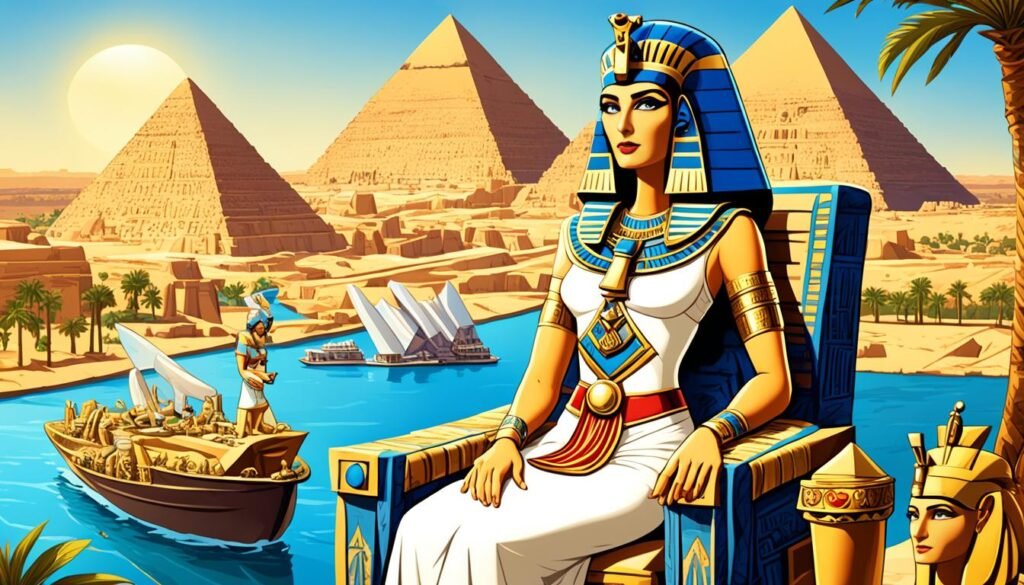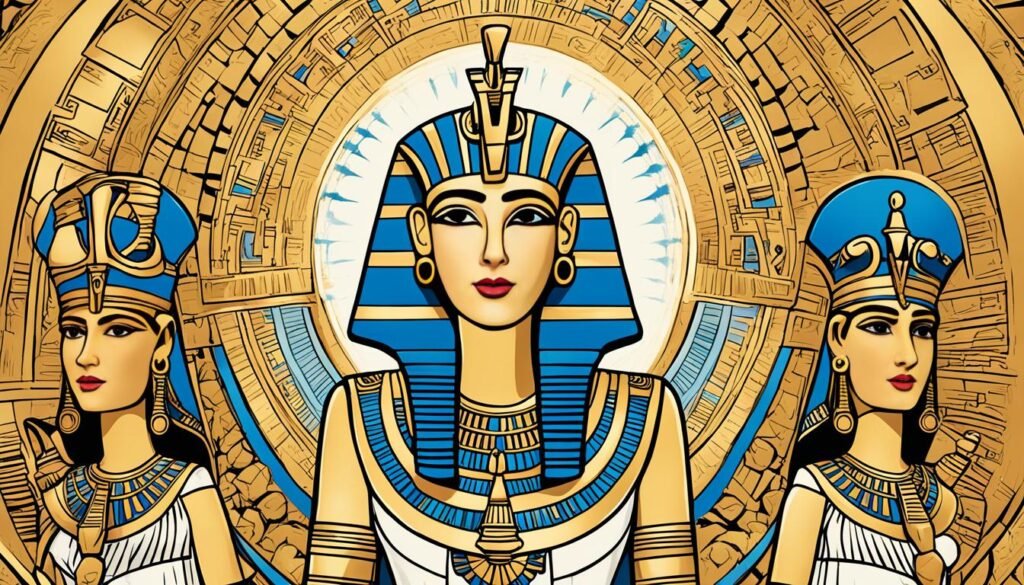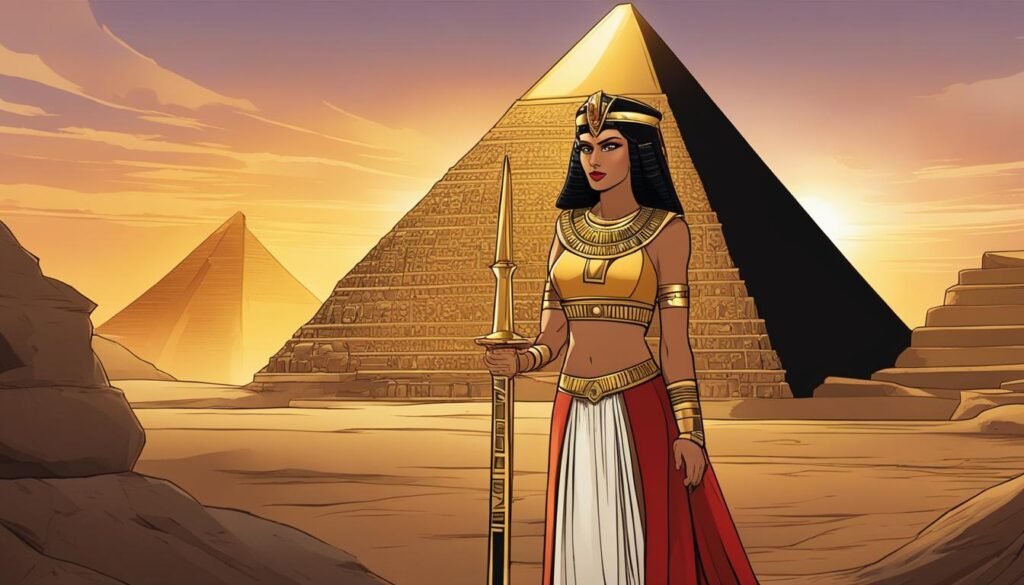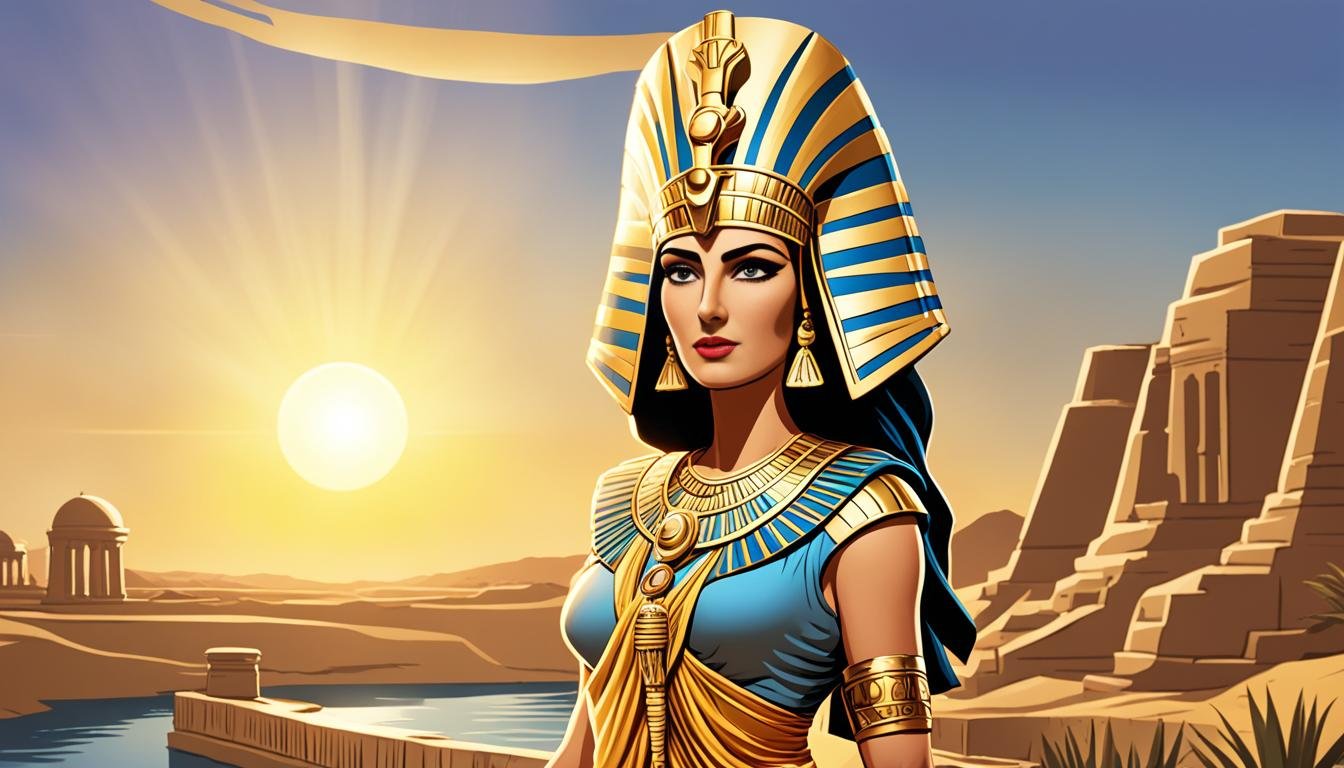In the timeline of history, there are certain figures whose lives and legacies have left an indelible mark on the ancient world. Two such figures are Cleopatra and Jesus. Cleopatra, the last active ruler of Egypt’s Ptolemaic Kingdom, and Jesus, the central figure of Christianity, both shaped the course of history in their own unique ways.
One intriguing question that often arises is whether Cleopatra was born before Jesus. To understand the context and impact of their lives, it is essential to explore their timelines and historical significance.
Key Takeaways:
- Cleopatra and Jesus are two historical figures who left lasting legacies in the ancient world.
- Cleopatra lived from 69 BC to 30 BC, a few decades before Jesus is believed to have been born.
- While Cleopatra was renowned for her political acumen and influence in the eastern Mediterranean, Jesus’ teachings formed the basis of Christianity.
- Their timelines, though separate, coincide with significant historical events that shaped the ancient world.
- The images and portrayals of Cleopatra and Jesus have fascinated artists and writers throughout history.
Cleopatra’s Timeline
Cleopatra, one of the most famous queens in history, lived during a remarkable period in ancient Egypt. Her timeline provides valuable insights into her life and rule.
Born in 69 BC: Cleopatra was born in Alexandria, Egypt, in the year 69 BC. She was a member of the Ptolemaic dynasty, which ruled Egypt after the death of Alexander the Great.
Death in 30 BC: Cleopatra’s life came to a tragic end on August 12, 30 BC, at the age of 39. After the defeat of her forces by Octavian (later known as Emperor Augustus), she took her own life, possibly by snakebite.
To get a clearer picture of Cleopatra’s timeline, here is a table summarizing the key events:
| Year | Event |
|---|---|
| 69 BC | Cleopatra’s birth in Alexandria, Egypt |
| 51 BC | Cleopatra becomes co-ruler with her father, Ptolemy XII |
| 48 BC | Cleopatra’s relationship with Julius Caesar begins |
| 44 BC | Assassination of Julius Caesar |
| 41 BC | Cleopatra meets Mark Antony in Tarsus, forming an alliance |
| 37 BC | Cleopatra and Mark Antony have twins, Alexander Helios and Cleopatra Selene |
| 31 BC | Defeat of Mark Antony and Cleopatra’s forces at the Battle of Actium |
| 30 BC | Cleopatra’s death, marking the end of the Ptolemaic dynasty |
It’s fascinating to explore the events and influences that shaped Cleopatra’s reign and legacy.
Jesus’ Timeline
According to the consensus among scholars, Jesus of Nazareth was born around the beginning of the first century, between 7-2 BC. His birth is believed to have occurred during the reign of King Herod the Great. The exact year of his death is not definitive, but most experts place it between 30-33 AD.
Although there is no specific historical record of Jesus’ birth and death, biblical accounts, combined with other historical sources, provide a general timeline for his life. The Gospels of Matthew and Luke mention Jesus’ birth in Bethlehem, while the Gospel of Mark and other texts highlight his crucifixion in Jerusalem during the Passover season.
While specific details regarding Jesus’ early years are scarce, the time of his public ministry, teaching, and miraculous acts is more substantial. It is during this period, which is generally believed to have occurred in the early 30s AD, that Jesus’ impact on the world and the development of Christianity began to emerge.
Jesus’ teachings, parables, and encounters with various individuals, as documented in the New Testament, formed the foundation for his message of love, forgiveness, and salvation. His crucifixion, followed by the resurrection, became the pivotal event in Christian theology, resulting in the formation of a faith that has influenced countless individuals throughout history.
While the exact details of Jesus’ timeline may be subject to scholarly debate, the lasting impact of his life and teachings remains undisputed. The development of Christianity as a major world religion and the profound influence of Jesus’ message continue to shape the lives of millions of people around the globe.
Key Events in Jesus’ Life:
| Event | Date |
|---|---|
| Jesus’ Birth | 7-2 BC |
| Jesus’ Crucifixion | 30-33 AD |
| Resurrection | 30-33 AD |
| Ascension | 30-33 AD |
Historical Context
The historical context in which Cleopatra and Jesus lived was marked by significant political and social changes that had a lasting impact on the world.
Cleopatra’s reign coincided with the Roman civil wars and the rise of the Roman Empire. During this time, political power in Egypt was closely intertwined with the ambitions and struggles of Rome. Cleopatra herself had relationships with some of the most powerful Romans of the time, including Julius Caesar and Mark Antony. Her interactions with these figures influenced the balance of power in the ancient world.
“Cleopatra’s relationships with Julius Caesar and Mark Antony further illustrate the complex web of alliances and power dynamics during her time.”
Jesus, on the other hand, lived during a crucial period in the history of the Roman Empire. The region was under Roman rule, and the Jewish people, among whom Jesus emerged, had a tense relationship with their Roman overlords. In this context, Jesus’ message of love, compassion, and the kingdom of God challenged both the religious and political authorities of the time.
These circumstances set the stage for significant historical events that would shape the course of the world. Both Cleopatra and Jesus were influential figures in their respective contexts and contributed to the larger historical narrative.
Cleopatra’s Influence
Cleopatra, the renowned ruler of Egypt, held significant influence over the ancient world during her reign. For 21 years, she governed Egypt with strategic leadership and diplomatic finesse, leaving an indelible mark on history.
Cleopatra’s Control:
During her time as queen, Cleopatra held sway over a substantial portion of the eastern Mediterranean coast, including Egypt, parts of modern-day Libya, and parts of modern-day Israel and Lebanon. This territorial control allowed her to exert her influence over trade, resources, and the political landscape of the region.
Diplomacy and Relations:
Cleopatra skillfully managed diplomatic relationships with various foreign powers, including Rome, the dominant political force of the time. Her intimate affairs with Roman leaders, notably Julius Caesar and Mark Antony, further enhanced her position and leverage in the ancient world. Cleopatra’s alliances and dealings with influential figures allowed her to navigate complex power dynamics and further consolidate her influence.
| Foreign Powers Cleopatra Engaged With: | Influence and Impact on the Ancient World: |
|---|---|
| Rome | Elevated her political standing and positioned Egypt favorably in the Roman Empire. |
| Parthian Empire | Strengthened her regional authority and trade relations in the east. |
| Mauretania | Forged economic and political ties, expanding her reach in North Africa. |
| Greece | Fostered cultural exchanges and intellectual pursuits, promoting the influence of Hellenistic civilization. |
Geopolitical Impact:
Cleopatra’s diplomatic prowess and territorial control contributed to shaping the geopolitics of the ancient world. By aligning herself with major powers and expanding Egypt’s sphere of influence, she played a significant role in the balance of power in the Mediterranean region.
“Cleopatra’s influence extended beyond her own kingdom, permeating the politics, culture, and trade of the ancient world.” – Ancient History Scholar
This influence extended to areas such as art, architecture, literature, and philosophy, reflecting Egypt’s cultural and intellectual prominence during her reign.

Jesus’ Impact
Jesus’ teachings and actions had a profound impact on the ancient world and beyond. Through his life, crucifixion, and the spread of his teachings, Christianity emerged as one of the world’s major religions. His message of love, compassion, and redemption resonated with people across cultures and continues to shape the lives of millions today.
Jesus’ impact can be seen in various aspects:
- Spiritual Transformation: Jesus’ teachings challenged the prevailing religious norms of the time and offered a message of personal transformation and salvation. His emphasis on love, forgiveness, and the importance of inner righteousness transformed the spiritual landscape of the ancient world.
- Spread of Christianity: Following Jesus’ crucifixion, his disciples carried forward his message, spreading the teachings of Christianity throughout the Roman Empire and beyond. This rapid expansion led to the establishment of Christian communities and the eventual adoption of Christianity as the state religion of the Roman Empire.
- Social and Ethical Impact: Jesus’ teachings emphasized the value and dignity of every individual, regardless of social status, race, or gender. His teachings on charity, justice, and the importance of caring for the marginalized influenced societal attitudes towards compassion and social responsibility.
- Cultural Influence: The impact of Jesus’ teachings extends beyond religion. Christian art, literature, and music have shaped the cultural heritage of numerous civilizations. The story of Jesus, his miracles, and parables continue to inspire artists and filmmakers, contributing to the rich tapestry of human creativity.
Jesus’ message of love, forgiveness, and salvation has transcended time and continues to touch the lives of millions around the world. His teachings have not only had a lasting impact on the ancient world but also played a pivotal role in shaping the course of history.
Cleopatra’s Legacy
Cleopatra’s story has transcended time, captivating the imagination of people throughout history. Her legacy as a historical figure is undeniable, leaving an indelible mark on the ancient world.
Her unique position as the last active ruler of the Ptolemaic Kingdom of Egypt has made her a subject of fascination. Cleopatra’s name has become synonymous with beauty, power, and intrigue, etching her place in the annals of history.
“She was a woman of surpassing beauty.” – Plutarch
Artistic and literary works have further cemented Cleopatra’s status as a legendary figure. From Shakespeare’s iconic play to Hollywood adaptations, her allure and mystique continue to inspire and captivate audiences.
Cleopatra’s Enduring Influence
Despite her tragic demise, Cleopatra’s impact has endured beyond her lifetime. Her leadership and diplomatic acumen during a turbulent era showcased her resilience and strategic thinking.
Under her rule, Egypt flourished as a cultural and economic powerhouse, exerting influence over the eastern Mediterranean coast. Cleopatra’s alliances with the Roman Empire and her role in shaping the geopolitics of the ancient world solidified her as a formidable political force.
Moreover, Cleopatra’s legacy extends beyond her political achievements. Her story serves as a testament to the power of female leadership and the ability to defy societal expectations.
The Legend Lives On
Through the ages, Cleopatra has become a symbol of strength, intelligence, and ambition. Her name evokes a sense of grandeur and mystery, perpetuating the fascination surrounding her life and reign.
From ancient historians to modern scholars, Cleopatra remains a subject of intense study and debate. Her legacy continues to shape our understanding of ancient history and the complex dynamics of power.

| Aspect | Impact |
|---|---|
| Political Influence | Established diplomatic alliances and controlled a significant territory, shaping the geopolitics of the ancient world. |
| Cultural Icon | Inspired countless artistic and literary works, becoming a symbol of beauty, power, and intrigue. |
| Female Leadership | Challenged societal norms and demonstrated the capabilities of female rulers in a male-dominated world. |
The Image of Cleopatra
The image of Cleopatra has been shaped by various interpretations and artistic representations. Throughout history, writers, artists, and filmmakers have contributed to the mythologized version of Cleopatra as a seductive temptress, captivating audiences with her beauty and allure.
“Age cannot wither her, nor custom stale her infinite variety.” – William Shakespeare
Shakespeare’s portrayal of Cleopatra in his play Antony and Cleopatra has influenced popular perception of the Egyptian queen. His characterization presents her as a captivating and manipulative figure whose sensuality holds power over men.
Artists, too, have played a significant role in influencing the image of Cleopatra. Paintings and sculptures depict her in lavish attire, exuding elegance and charm. These representations often emphasize her physical beauty and seductive allure, perpetuating the image of Cleopatra as a captivating and irresistible figure.
The captivating image of Cleopatra as a seductive temptress has been reinforced through various forms of media and popular culture. Films like Cleopatra starring Elizabeth Taylor further solidify this portrayal, contributing to the enduring fascination with Cleopatra’s beauty and allure.
Cleopatra in Popular Culture
- Cleopatra’s image as a seductress has been perpetuated through literature, theater, and film.
- Artistic representations often emphasize her physical beauty and allure.
- Shakespeare’s play Antony and Cleopatra has influenced the popular perception of Cleopatra as a captivating and manipulative figure.
- The film Cleopatra starring Elizabeth Taylor has further contributed to the enduring fascination with Cleopatra’s image as a seductive temptress.
| Interpretations of Cleopatra | Description |
|---|---|
| Shakespeare’s Cleopatra | A captivating and manipulative figure with unlimited allure. |
| Artistic Depictions | Emphasize her physical beauty and seductive power, reinforcing the mythologized image of Cleopatra. |
| Film Portrayals | Present Cleopatra as a seductive temptress, capturing her beauty and allure on screen. |
Cleopatra and Power
Cleopatra’s rule as a female leader in a male-dominated world was noteworthy. She demonstrated political acumen, strategic alliances, and the ability to navigate complex power dynamics during her time as the ruler of Egypt.
| Leadership Qualities | Examples |
|---|---|
| Political Acumen | Successfully maintained Egypt’s independence by skillfully aligning with powerful Roman leaders such as Julius Caesar and Mark Antony. |
| Strategic Alliances | Forged strong alliances through diplomatic marriages, including her relationships with Julius Caesar and Mark Antony. |
| Power Dynamics | Managed the delicate balance of power between Rome and Egypt, leveraging her position to secure resources and protect her kingdom. |
In a world where women had limited opportunities for leadership, Cleopatra defied expectations and wielded power with intelligence and skill. Her ability to navigate complex political landscapes solidified her reputation as a formidable leader.
Historical Significance
Cleopatra’s rule challenged gender norms and showcased the potential of women in positions of power. Her legacy as an influential leader endures to this day.”
Cleopatra’s leadership offers an inspiring example of what is possible when individuals break through societal barriers to achieve greatness. Her reign serves as a reminder that true power lies not in one’s gender but in their ability to navigate the intricate web of politics and exert influence.
Leadership Lessons from Cleopatra
- Embrace strategic thinking and adaptability to navigate challenging circumstances.
- Build and nurture relationships to establish alliances and gain support.
- Challenge societal expectations and stereotypes to pave the way for future generations.
By studying Cleopatra’s leadership, we can gain valuable insights into effective strategies for exerting power and influence, regardless of gender or other societal constraints.

Conclusion
Cleopatra and Jesus, though they lived in different times and had different impacts on the world, both left lasting legacies that continue to be studied and appreciated today. Cleopatra’s influence on the ancient world and Jesus’ impact on the development of Christianity have shaped the course of history.
Cleopatra, the last ruler of the Ptolemaic Kingdom of Egypt, was known for her political prowess and strategic alliances. Her reign extended over 20 years, during which she controlled a significant portion of the eastern Mediterranean coast. Cleopatra’s diplomatic relations with foreign powers and her influence on ancient geopolitics solidified her place in history.
On the other hand, Jesus of Nazareth, believed by many to be the Son of God, had a profound impact on the world through his teachings and the emergence of Christianity. His crucifixion and the spread of his Gospel message led to the formation of one of the world’s major religions. The legacy of Jesus and the growth of Christianity have shaped cultures, societies, and the lives of billions of people throughout history.
These two influential figures, Cleopatra and Jesus, have left indelible marks on the world. Cleopatra’s power and impact as a female leader in a male-dominated society and Jesus’ teachings of love, compassion, and salvation have resonated across time, leaving a lasting legacy for generations to come.
FAQ
Was Cleopatra born before Jesus?
Yes, Cleopatra was born in 69 BC, while Jesus is suspected to have been born between 7-2 BC. Cleopatra died in 30 BC, approximately 20-30 years before Jesus’ birth.
What is Cleopatra’s timeline?
Cleopatra was born in 69 BC and died on August 12, 30 BC, at the age of 39.
What is Jesus’ timeline?
Most scholars agree that Jesus was born around the beginning of the first century, between 7-2 BC, and died between 30-33 AD.
What was the historical context during Cleopatra and Jesus’ time?
Cleopatra’s reign and death took place during a time of significant historical events, including the Roman civil wars and the rise of the Roman Empire. Similarly, Jesus’ life coincided with significant political and social changes in the region.
What influence did Cleopatra have on the ancient world?
Cleopatra ruled Egypt for 21 years and controlled a significant portion of the eastern Mediterranean coast. She had diplomatic relations with various foreign powers and played a role in shaping the geopolitics of the ancient world.
What impact did Jesus have on the ancient world?
Jesus’ teachings and actions laid the foundation for the development of Christianity, which became one of the world’s major religions. His crucifixion and the spread of his teachings had profound effects on the ancient world and beyond.
What is Cleopatra’s legacy?
Cleopatra’s story has continued to capture the imagination of people throughout history. She has been the subject of numerous artistic and literary works, and her name has become synonymous with beauty, power, and intrigue.
How is Cleopatra portrayed in history and popular culture?
The image of Cleopatra has been shaped by various interpretations and artistic representations. Writers and artists, including Shakespeare, have contributed to the mythologized version of Cleopatra as a seductive temptress.
How did Cleopatra navigate power as a female leader?
Cleopatra’s rule as a female leader in a male-dominated world was noteworthy. She demonstrated political acumen, strategic alliances, and the ability to navigate complex power dynamics during her time as the ruler of Egypt.
What is the impact and legacy of Cleopatra and Jesus?
Cleopatra and Jesus, though they lived in different times and had different impacts on the world, both left lasting legacies that continue to be studied and appreciated today. Cleopatra’s influence on the ancient world and Jesus’ impact on the development of Christianity have shaped the course of history.
Source Links
- https://religion.culture.narkive.com/5y2ysyou/was-cleopatra-alive-when-jesus-was-born
- https://lessgovisthebestgov.com/from-Caesars-death-to-Jesus-birth.html
- https://www.smithsonianmag.com/history/rehabilitating-cleopatra-70613486/

I’m Benjamin, a passionate spiritual seeker and creator of Verses and Prayers. Alongside my girlfriend Emma and our pet lizard Mulle, I cherish family life, enjoy exploring new places, and am deeply involved in my church community. My love for reading and singing biblical verses inspires every aspect of my journey.

